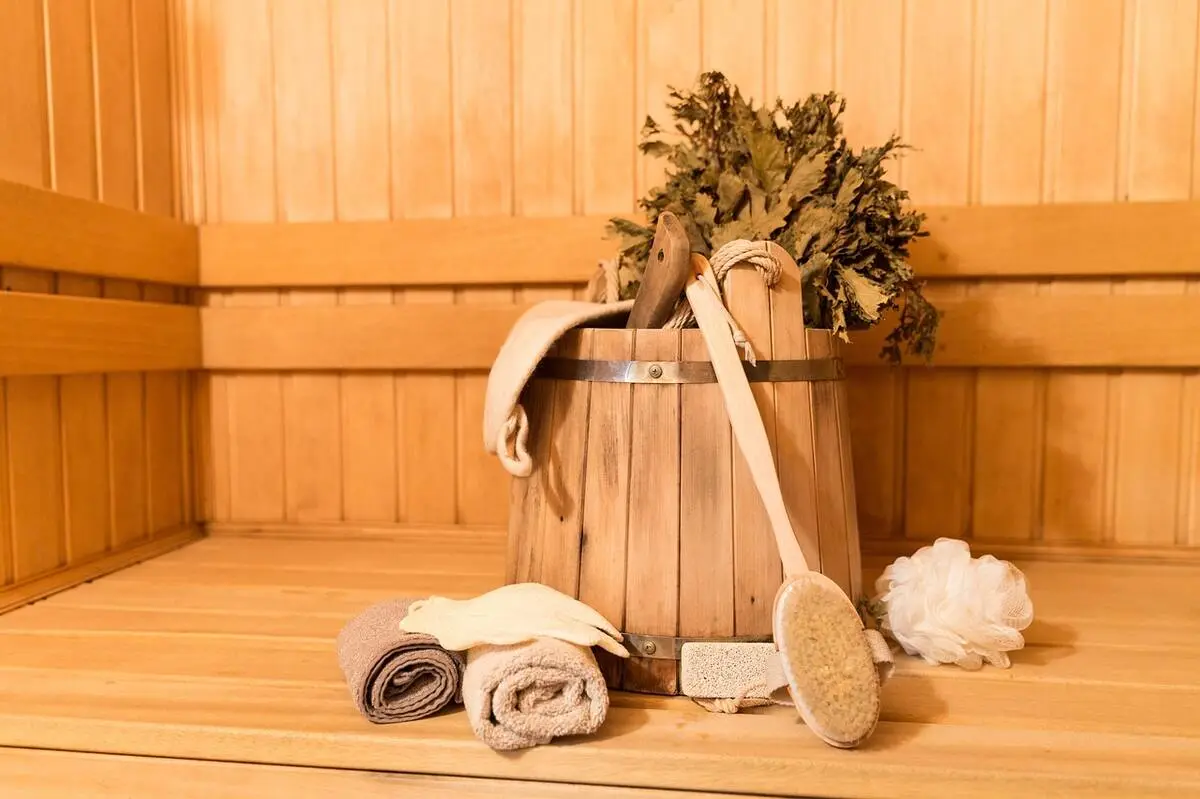SOOTHE YOUR SORE THROAT: Is Sauna Good For It?
Is sauna good for sore throat? The answer may surprise you. The heat and humidity of a sauna create a dual effect – providing comforting relief for throat irritation while promoting a calming atmosphere that enhances healing. As you sit in the sauna, the warmth increases your heart rate and blood circulation, which can help reduce inflammation and deliver more immune cells to the affected area, potentially speeding recovery. The moist heat may also loosen mucus and soothe scratchy throat tissues, offering temporary symptom relief.
The moist air will prevent your throat from drying out, making swallowing painful. Perhaps that’s why so many people with sore throats swear the combination of heat and moisture eases their painful condition.
That said, it is still best to be as hydrated and in tune with your body as possible when using the sauna while sick. In subsequent posts, I’ll provide recommendations for how to make the most of a sauna.
You can read more about how to do it safely even if you have a sore throat.
What Causes a Sore Throat?
Whether it be infection, dryness, allergens or irritants, a sore throat can result from numerous causes, all leading to pain and inflammation. Identifying the causes of your sore throat is the first step to finding relief from your symptoms.
Viral Infections and Sore Throats
Bacterial infections, as a result of Group A gatherings of streptococcal bacteria, are other frequent triggers of sore throat. Rhinoviruses, for example, are the predominant cause of these symptoms. When your body interacts with a virus, it initiates an inflammatory response, which causes pain.
This inflammation is usually present with other cold symptoms, including coughing and nasal congestion. It’s important to replenish your body with extra rest and fluids while you’re sick, especially with sore throat, as they aid in your body’s recovery.
Bacterial Infections and Sore Throats
Bacterial infections, especially those with streptococcus, can cause more intense throat pain. Where viral infections can generally be treated at home, bacterial sore throats should be treated by a physician. You may experience symptoms such as a high fever and inflamed tonsils.
Here are a few symptoms to help you discern the difference between a bacterial infection and a viral one. Untreated bacterial infections can result in serious complications, even threatening your life.
Environmental Irritants and Sore Throats
Dry air, particularly in the winter months, can make throat irritation worse. Irritants such as smoke, chemicals, and strong odors can cause additional irritation to the throat. In addition, allergens like pollen and dust can cause symptoms as well.
To soothe a sore throat, reducing your exposure to these irritants is helpful. Finally, don’t underestimate the sauna’s value to your recovery. The intense heat causes an increase to your heart rate, similar to that of moderate exercise, boosting healthy circulation.
This rush of circulation brings with it a greater delivery of oxygen and nutrients to the throat, which can support the healing process.
Is Sauna Good for Sore Throat? How Heat Therapy Helps
To conclude, sauna therapy is a wonderful and practical remedy for the momentary discomfort of a sore throat. The soothing tropical oasis that is a sauna works to curtail pain by promoting a calming milieu that soothes irritation.
When you step inside a sauna, the warmth surrounds you, taking the edge off your throat discomfort. Inhale the warm air to soothe inflammation and create a calming environment. This option is particularly advantageous for anyone dealing with throat pain.
1. Heat’s Impact on Throat Inflammation
This increased exposure to heat in the sauna reduces inflammation present in the throat, resulting in a decrease in symptoms. When you apply heat, your body reacts by rushing blood flow to that area, promoting healing of damaged tissues.
This physiological response is essential for reducing the inflammation that produces pain. To improve sore throat symptoms, start with lower temperatures, because high temps can irritate you more.
2. Sauna Therapy and Mucus Production
Sauna can induce mucus thinning, giving you relief from sore throat irritation. The build-up of steam in the sauna helps break down mucus and open up nasal pathways, allowing for deeper breaths.
This humid heat is especially helpful at relieving the congestion that accompanies sore throats. So, using sauna therapy along with other treatments may provide greater mucus relieving benefits and overall throat comfort.
3. Pain Relief Mechanisms of Sauna
Heat acts as a natural pain reliever for the discomfort caused by a sore throat. When using the sauna, endorphins are released and can provide a greater level of relief from pain.
The stress relief found in a sauna helps reduce pain even further. Relaxation helps keep stress levels low, which helps reduce pain. The calming influence of humidified air on sore throat tissues offers instant relief.
4. Sauna’s Effect on Nasal Congestion
Using sauna can help fight nasal congestion and open up your nasal passages. Steam encourages better air passage through the sinuses, aiding in breathing, which is especially helpful during cold or allergy season.
Sauna can take on the role of a beneficial adjunct therapy for sinus problems.
5. Immune System Boost from Sauna
Sauna therapy Regular sauna use boosts immune function through increased body temperature, developing a more balanced immune system and improving health and resistance to infections.
By improving circulation, sauna assists with immune response, which is why sauna therapy is a great complement to any wellness routine.
Sauna vs. Steam Room: Which Sauna Is Good for Sore Throat?
Whether you choose a sauna or a steam room, each provides an effective, therapeutic way to relieve your sore throat. Understanding their differences will significantly improve your comfort and help you recover faster.
Both offer their own specialties and advantages, which is better for you usually comes down to what you prefer and need.
Humidity’s Role in Throat Comfort
The increased humidity of a steam room can offer instant comfort from dry and scratchy throats. The muggy atmosphere works wonders at easing discomfort, particularly while under the weather.
Saunas tend to have lower humidity. Even though they don’t provide similar respiratory relief, they sometimes do produce equivalent relaxation benefits seen with higher humidity levels.
Steam rooms usually keep a level of 100% humidity, perfect for anyone looking for extra moisture. With the heat usually provided by a central stove, saunas deliver a very dry heat.
This gentle heat is great for easing congestion, a nasty symptom of the winter colds. Adjusting humidity levels in a sauna improves throat comfort. You might try using a hygrometer to establish your ideal level.
Accessibility and Personal Preference
Both saunas and steam rooms are commonly found in gyms and spas, which makes both options easily accessible to many. Your decision might come down to how comfortable you are with heat and humidity.
Some people just really like the intense, dry heat found in a sauna. Many people are more comfortable in a steam room’s moisture-drenched atmosphere.
Home sauna options offer you the convenience of regular use, letting you customize your experience to your liking. By choosing the one that best fits your lifestyle and health goals, you’ll reap the maximum benefits for comfort and recovery.
Scientific Evidence: Is Sauna Good for Sore Throat Relief?
The scientific evidence sauna therapy provides relief from sore throats and overall respiratory distress. Research demonstrates that heat can bring numerous healing effects to the body. It can be particularly useful for relief from common cold symptoms.
The heat in a sauna calms inflamed tissues and helps relax sore muscles. This added comfort can allow you to heal faster from the irritation in your throat.
Studies on Heat Therapy for Colds
A few pivotal studies have outlined the positive effects heat therapy may have on cold symptoms. One study determined that participants who used saunas saw a significant reduction in throat discomfort. They found reductions in various symptoms including the severity of nasal congestion.
The influence of sauna on reducing symptoms of upper respiratory infections is impressive. Make sure that you’re consistent with your sauna use to help shorten your recovery times. The heat increases blood flow, making your immune system more vigorous and effective.
To learn more, read our overview of the scientific literature on heat therapy. This is most evident in the unique guidance it provides about its efficacy with specific cold-related symptoms.
Expert Opinions on Sauna Benefits
Healthcare professionals are becoming more aware of the healing powers of sauna therapy for sore throats. Experts largely agree on its safety and its effectiveness as a complimentary treatment.
Anecdotal evidence from practitioners focuses on a high number of patients finding relief from throat irritation after sauna therapy. This collective wisdom from the medical community underscores the importance of considering expert advice when incorporating sauna use into your health routine.
Who Should Avoid Sauna Use?
Although saunas provide numerous health advantages, certain populations should not use them to protect their health and safety. Knowing who should avoid sauna use and why will help you make the best decisions for you about using sauna therapy.
Individuals with Fever
If you are sick with a fever, skipping sauna use is especially important. The heat from the sauna will increase your core body temperature even more, you may be at risk for overheating. This can worsen symptoms such as chills and fatigue.
Rest and hydration are your greatest friends when fighting fever, as your body requires time to heal. As a good rule of thumb, you should wait for your fever to break before trying sauna therapy. This method gives your body the chance to heal without stressing it further with heat exposure.
People with Respiratory Conditions
People with shortness of breath due to asthma, COPD, or other respiratory illness should be cautious about sauna use. The heat and humidity of a sauna can make it harder to breathe and bring on other symptoms as well.
If you have any respiratory conditions, it’s vital to speak with your healthcare provider before using a sauna. Home treatments such as steam inhalation or use of a humidifier can provide comfort.
These alternatives have less risk than sauna use. These alternatives are much safer and effective in relieving inflammation and opening airways, without putting you at risk of dangerous heat.
Those with Cardiovascular Issues
Those with serious heart conditions should use extreme caution with sauna use. Extreme heat increases the risk of cardiovascular strain, even more so if you have existing complications.
When using a sauna, heart rate monitoring is vital for safety. It’s best to consult with a healthcare professional before using a sauna.
Their expertise can offer personalized guidance aligned with your health conditions, maximizing the benefits of your sauna while minimizing any risks.
Is Sauna Good for Sore Throat? Key Risks and Precautions
Using a sauna can offer relaxation and potential health benefits, but it’s crucial to consider the risks involved, especially if you have underlying health issues. Knowing any potential health risks or contraindications before entering the sauna can save you from sudden adverse effects.
Understanding these risks allows you to better customize your sauna experience to fit your personal needs, maximizing the benefits while being mindful of potential dangers.
Dehydration and Sore Throat
Since dehydration can aggravate sore throat symptoms, sauna use should be approached with caution. When your body is subject to extreme heat, it loses moisture quickly.
To counteract this, hydrating with water before, during, and after your sauna session is crucial. Have a water bottle within reach to help you stay hydrated.
Pay attention to symptoms of dehydration such as a dry mouth, dizziness, or dark, scant urine. If you experience any of these symptoms, it’s time to hydrate! Stay hydrated, drink small amounts of water frequently in the sauna.
Increase your hydration even more by eating foods that hydrate you.
Overheating and Weakness
It’s pretty obvious that overheating is dangerous, but it can be especially harmful for those who are already under the weather. Signs of heat exhaustion are heavy sweating, faintness, and confusion.
To avoid overheating, keep sauna sessions between 15-20 minutes each. As with anything, always listen to your body.
If you begin to feel faint or lightheaded, leave the sauna right away and cool down. This practice will help you maximize the experience and not risk your health while doing so.
Potential for Spreading Infection
When someone is symptomatic, communal saunas can increase the risk of spreading infections even further. Practicing good hygiene is equally important.
Use a towel to sit on and limit close physical contact with others. Whenever you use a sauna, try to choose private or home ones to reduce this chance.
To minimize the risk of spreading infection, it is advisable to skip sauna visits when you are unwell.
Safe Sauna Practices for Sore Throat
When used wisely and cautiously, a sauna can deliver comforting relief from a sore throat and an array of other ailments. Taking care to follow safe practices means you can enjoy all of the benefits saunas have to offer without risking your health.
Stay Hydrated Before, During, and After
Hydration is especially important when using a sauna, but even more so if you have a sore throat. Consume hydrating liquids prior to sauna use to help your body adjust. Having water close at hand throughout your session is incredibly important.
Frequent sips of water will ensure you stay adequately hydrated. Refresh yourself. Replenish any lost fluids after your sauna use to prevent dehydration. Look for drinks such as herbal teas, which can offer more throat relief through their soothing capabilities.
Limit Sauna Session Duration
Sauna sessions on the short side are optimal when you’re under the weather. Safer sauna practices start with 5–10 min and gradually increase the time as your body gets used to it. If you start to feel dizzy or uncomfortable, it’s essential to leave the sauna immediately.
You’ll know how long you’ve been in the sauna by setting a timer. That way, you can maximize all the good without overdoing it.
Monitor Body Temperature
It’s very important to listen to your body—especially your core temperature—while in the sauna. If you start to feel overheated at all, make sure that you exit the sauna right away. A sauna thermometer can help you monitor your temperature and make sure you don’t go overboard.
Making conscious decisions about your sauna experience to match your personal comfort will make your time in the sauna more enjoyable and safe.
Avoid Alcohol and Medications
Avoiding alcohol prior to and during sauna session is important, as it contributes to dehydration. Be aware that many medications have an impact on the body’s ability to tolerate heat. Whatever the case, it’s a great idea to talk with a healthcare provider about it!
Choosing non-alcoholic drinks helps you stay hydrated without the extra health threats.
Listen to Your Body’s Signals
Listening to how your body responds each time you use the sauna is key. If at any point you start to feel lightheaded or uncomfortable, it’s important to leave the sauna immediately. Listening to your body and respecting your limits will help make your sauna experience both safe and beneficial.
Keeping track of symptoms helps you determine how effective the sauna is for you.
Maximize Sore Throat Relief
It’s a great idea to use a sauna to help relieve discomfort from a sore throat. For best results, use sauna as a complement to these few sauna-boosting practices. Use this method to achieve more effective relief and make your recovery easier.
Combine Sauna with Hydration
These benefits of sauna therapy are greatly enhanced when sauna use is combined with adequate hydration. Especially herbal teas. Drinking warm fluids, especially herbal teas, before and after your sauna time can really improve the soothing effects.
Herbal teas, particularly those with soothing properties like chamomile or ginger, provide warmth and moisture that can ease throat irritation. Avoid sweat-dehydrating beverages. It’s important to avoid dehydrating beverages, like caffeinated drinks or alcohol, while using a sauna. Proper hydration will keep your body hydrated inside and out, enhancing the benefits of the sauna experience for your sore throat.
Consider Complementary Treatments
Along with regular sauna therapy, there are other incredibly soothing remedies to help relieve throat discomfort. Throat lozenges offer immediate relief, and warm salt water gargles can reduce inflammation and bacteria.
Combining these therapeutic treatments with sauna sessions provides a multifaceted approach to managing throat discomfort. Herbal teas, particularly those with honey, can provide an extra soothing touch. Whether you take home dumplings or a bottle serum, just remember the key—finding what works best for you! Everyone reacts differently!
Rest and Recovery are Essential
Rest is essential when recovering from a sore throat. Adequate sleep improves your body’s natural healing processes, and balancing sauna use with post-session relaxation can supercharge your recovery efforts.
Maximize your recovery by making your healing environment restful, quiet, dark, and cool. Giving yourself the time and space to unwind helps your body heal more effectively, and your sauna sessions work more powerfully.
Different Types of Saunas
Saunas have many shapes and sizes, each one providing distinct experiences and with them, different benefits. Knowing the different types can help you choose the right one for your needs, particularly if you’re looking for relief from sore throat.
Dry Saunas: Benefits and Considerations
Dry saunas create heat through convection, usually generated by electric heaters or wood stoves. This type of dry heat is fantastic for relaxing muscles and reducing pain and tension. The deep heat promotes blood flow, which can relieve pain and ease tension.
Hydration is just as important—experts point out that the dry sauna setting makes it easier to become dehydrated. It’s extremely important to hydrate with water before and after your session.
Pay attention to your body in a dry sauna. Those high heat temperatures are no joke, so make sure you’re listening to your body.
Steam Saunas: Benefits and Considerations
Steam saunas produce a very wet, humid environment that’s rich in steam. This humid space is known to improve lung health and relax throat irritation relief. That’s because the steam helps to hydrate your throat, offering a cooling sensation that dry heat just can’t provide.
If too much humidity builds up, it can create a hot, sticky sauna that is more unpleasant than relaxing. A steam sauna is especially beneficial when you’re in need of that additional moisture to provide temporary relief.
Infrared Saunas: Benefits and Considerations
Infrared saunas rely on cutting-edge heating technology to warm your body from the inside out. This process does not heat up the air around significantly. This technique goes further beneath the surface of the tissue to move and release tension, improving relaxation.
As it works at lower temperatures, it is more comfortable for longer sessions. For this reason, many people prefer using infrared saunas as a gentler alternative while still experiencing powerful healing effects.
Try an infrared sauna and you’ll find an experience that might cater more to your needs or preferences.
Sauna for Prevention of Sore Throats?
In fact, frequent sauna use can significantly improve your wellbeing. It’s particularly effective to help fortify your immune system and promote your respiratory wellness. Make sauna sessions a regular practice. Learn how you can unlock your body’s natural defenses to help prevent sore throats and more!
Regular Use and Immune Function
More frequent sauna sessions may be required in frequent intervals to build these immune responses. This heat exposure has the effect of accelerating the production of white blood cells, which are key in fighting off infections.
Research indicates that regular sauna bathers experience lower incidence of colds and other respiratory infections. Making regular sauna use a priority is one of the best things you can do to improve your immune health.
As with all therapeutic treatments, consistency is key. Making a commitment to go to the sauna regularly—preferably two to three times a week—will reap sustainable rewards over time. Measure how much healthier you feel, such as reduced sick days and faster recovery.
Get ready to discover the many ways sauna therapy can improve your health and wellness!
Long-Term Respiratory Health
The contribution sauna use can make to overall respiratory health is substantial. The warm, humid atmosphere aids in optimal lung function and helps to expel mucus, allowing for easier breathing.
This is very helpful for people who suffer from allergies or asthma. Making sauna therapy an integral part of your lifestyle will enhance your respiratory health.
Combine it with some deep breathing exercises and stay hydrated to maximize the effects. If you are experiencing chronic respiratory problems, talk to a medical professional.
In short, they assist you in developing a holistic wellness routine that addresses your individual health goals.
Other Home Remedies for Sore Throat
Though sauna therapy can provide much-needed relief from sore throat symptoms, many easy home remedies can make your throat feel even better. These other remedies are gentle but effective, offering support as your body does the healing work.
Gargling with Salt Water
Saltwater gargles are an easy at-home remedy for sore throats. The salt contributes to the osmotic effect, drawing out excess fluid from the tissues and reducing swelling and discomfort.
Salt offers antibacterial qualities that help fight bacteria in your throat leading to faster relief. Warm water is important when mixing your gargle. It works to relax the throat muscles and increase its effectiveness.
Make salt water gargles part of your daily practice. Taking this simple, proactive step can keep your throat healthy year-round, and particularly during cold and flu seasons.
Honey and Lemon
Honey and lemon are two well-known home muscle-relaxants, which when mixed together in a warm drink can help to ease sore throats. Honey’s inherent sweetness delivers immediate soothing relief, while its antimicrobial properties work to eliminate throat irritations.
Combine honey and lemon into hot tea for a deliciously soothing drink. This sweet and spicy mix is a treat in itself, but the ingredients do wonders for your throat, too.
Choosing natural ingredients is a good way to make sure you are being kind to your body while enjoying the power of their natural healing capabilities.
Over-the-Counter Pain Relievers
Over-the-counter medications are very effective at controlling pain associated with a sore throat. Ibuprofen and acetaminophen are over-the-counter staples that provide dual-action relief by addressing inflammation and easing pain.
It’s important to read dosage directions carefully so you can get the most benefit without risking overall health. If symptoms do not improve or are getting worse, consult with a medical professional.
They are ideally positioned to provide individualized pain management strategies tailored to your specific needs.
Conclusion
Enjoying a sauna is a wonderful way to find lasting relief for a sore throat. The combination of heat and steam both reduces pain and makes it easier to breathe. You choose to explore this easy practice, it can easily be integrated into your lifestyle, and provide a calming sanctuary. In fact, taking a sauna is much more effective alongside other home remedies to soothe sore throat. Listen to what your body is telling you and practice sauna safety to reap all the rewards safely.
If you’re one who frequently suffers from sore throats, think about incorporating sauna sessions into your regular self-care routine. Try this natural remedy, and you’ll notice the difference it makes. Take the plunge and find the easy way to cough and throat relief today.







